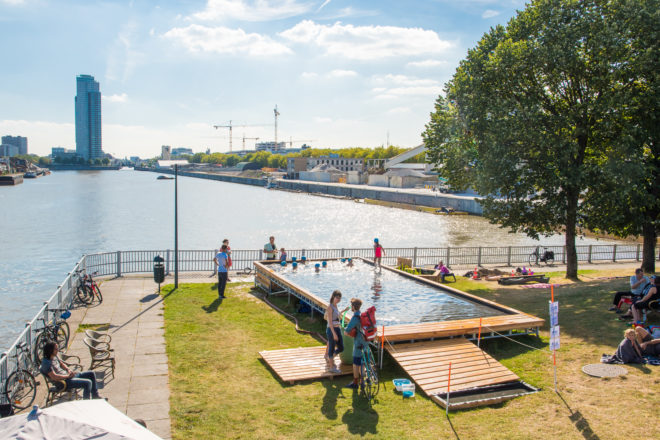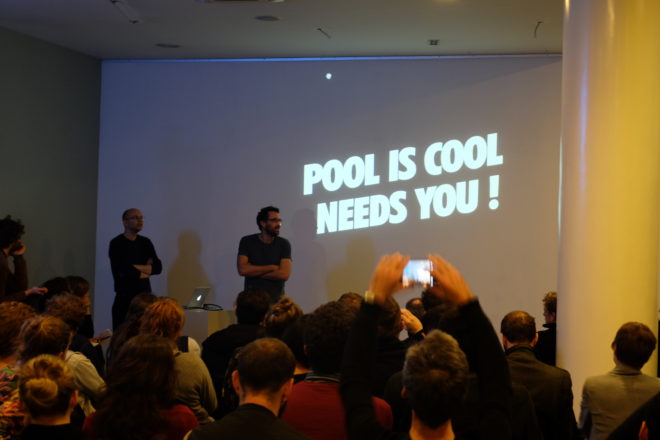POOL IS COOL
Our shape is unclear, we engage in different travels and approaches, and sometimes our energy manifests itself under different forms. This time is very liquid.
Two of us (Andrea Sollazzo and Louisa Vermoere) have been deeply involved in the creation, developing and growing of a story that deserve to be told, and that even if it is not completely and properly a collective disaster project it share with it values and experiences.
POOL IS COOL, that’s the name of the project, it’s quite of a long story: basically a group of “experts/citizens” start a strive for the revival of outdoor swimming in Brussels. The situation is quite simple and embarrassing, Brussels, the European capital, doesn’t offer to its citizens the possibility for swimming under the “blue” sky during hot days. If you want to swim under the “blue” sky, the city does not offer anything, or you are rich, or you take your car and drive outside the city, or you take a shower. For sure, a lot of you might say that this is not such a big drama, that there are a lot more urging priorities for our cities, and society. This is for sure. But we believe, and during our journey we are actually having the constant confirmation of it, that under and into the refreshing and light swimming pool topic, are laying a lot of aspects and components that make the story absolutely relevant on different levels. A kind of litmus paper of our cities struggles. For all the details about what and how POOL IS COOL operates we invite you to check the facebook page and website, what we would like to focus here is about how Louisa and Andrea approached to this project and what Collective Disaster is learning from and giving to it.
The approach: to stimulate this change we act. With creativity applied to a kind of low key urban activism we try to rise the topic and bring it to the attention of people, media, policy makers and other actors. Playfulness, daring , sometimes provocations together with irony are useful tools to engage in communications and to involve people. Yes because POOL IS COOL cannot exist without people, we need people, more people, and even more. We need to create a mass able to put pressure on the deciding elite.
This brings us to the other very interesting aspect: participation. In this project all the potentials and risks of this kind of bottom up initiatives are exposed. Politicians can very easily abuse of us, we work hard, good and for free. We are volunteers, and as volunteers we have to keep the borders clear and straight, sometimes we have to stop and control our energy, we would feel naturally to give more and work better and push harder, but then this would not be more voluntary, this would become a real job. Then it needs to be paid otherwise it’s not ethical and it will even become self-defeating. We would give the message that “those people like us” do not need to be paid, they do it because they like it. Then why pay for them? Why paying for their time, expertise, knowledge, networks? Administration, politicians and investors will know that there will always be some middle class “idiot” that will do their job for free. This is wrong. We have to keep this limit clear and strict. They (politicians) have nothing to lose: if things go well they will be there next, or actually, in front of us. If things go wrong, they will just ignore us. At the same time you realise the complete absurdity and nonsense in which our society often ends up: politicians are giving us financial support (obviously not much and for sure nothing structural) to create a public opinion that will put pressure on them to finally act. Well is this not a contradiction in therms? They and all the public workers and employers are very well paid to actually take care of our commons and public spaces and services. Why do they need us? Why they cannot just make this F##**& swimming pool happen? Aren’t them there to protect and guarantee the public and common interests? Why do they need us to generate support about a topic that they for first admit to be relevant?
And here we arrive to the third point: why is it relevant? Because it concerns with public space, public facilities and with the basic definition of quality of life and services. During the 20th centuries pools and other sport infrastructures were build by the state for the people. Was not about business, was about be sure that citizens have an healthy life and possibilities to remain in contact with their body and with nature. At the same time was a place for socialization, was a place for life to happen. All these were considered basic rights and priorities for the society that we were trying to build at that time. Look now? We have to fight for things that in the past were given. This is why this topic, in its simplicity and lightness shows the emergency. The crisis. It’s a clear example of how much our life and cities are dominated by the capital and by the profit. Public spaces are under constant attack of the profit. Soon we will have to pay to sit on benches, and people will even tell us that this is “normal”. Well projects like POOL IS COOL throws at our face the level of emergency that we are in.
Last point, but absolutely not the least: water. Water is a common good, water means nature and life. In our city water is reduced to mere decoration or dirty sewers. Well, this is not good. And again while working on this project we realize one time more how much bureaucracy can damage our environment, how much a change is urgently required. How much our waters are polluted and how much we are loosing.
Sometimes we really wonder about progress…
Collective Disaster brings all this in this project, the awareness that a public open-air swimming pool is not just an infrastructure, but it’s just another example of how much is at stake. Our whole society is changing and we need to provide new answer for ancient questions.
ps: if you want to help us, even from far you can do it, sign this petition, it take just few seconds and it will help POOL IS COOL to be heard. Here the link to the petition.

















